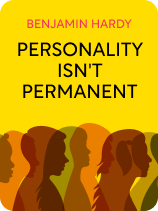

This article is an excerpt from the Shortform book guide to "Personality Isn't Permanent" by Benjamin Hardy. Shortform has the world's best summaries and analyses of books you should be reading.
Like this article? Sign up for a free trial here.
Do you keep falling off track with your goals? How do you keep pushing when the going gets tough?
The key to achieving any goal in life is to intentionally choose behaviors that contribute to your desired outcome. This means doing things that feel hard and uncomfortable in the short term but that pay off in the long term.
With this in mind, here are a few tips for achieving goals.
Base Your Behaviors and Decisions on Your Primary Goal
To reach your primary goal, you’ll need to structure your everyday behaviors and your broader life decisions around it. Most people structure their lives around their current personality—listening to their impulses, doing things that feel agreeable, and ultimately, not changing. Structuring your life around who you want to be instead of who you are breaks you out of this cycle and pushes you toward change.
(Shortform note: To make this journey feel less daunting, try starting small: You can immediately change your attitude and feel empowered by changing how you hold yourself. Psychology research shows that changing the way you hold your body and face changes how you feel: In one study, participants sitting upright while crossing their arms endured a challenging task longer than other participants. Another showed that smiling led participants to interpret events more positively. This suggests that holding yourself differently can immediately support you to meet your primary goal—for example, releasing tension if you’re trying to become a more laid-back person, or standing tall with your hands on your hips if you’re trying to become more confident.)
Living in service of your primary goal involves being intentional rather than impulsive. Instead of doing things that feel automatic and good in the moment—but don’t help you reach your primary goal—choose things that are harder in the short term but pay off in the long run.
On a smaller scale, this involves choosing behaviors that are consistent with your primary goal. For instance, you might choose leisure activities that replenish you and leave you energized to keep making progress instead of things that merely stimulate you and leave you feeling drained. On a larger scale, this involves basing your broader life commitments on your primary goal. For example, you might choose a job that pushes your comfort zone but helps you develop skills that will help you reach your goal.
| People’s Recognition of the Value of Delayed Gratification Throughout History Doing what’s uncomfortable in the moment but better for you in the long run may be one of the deepest, most fundamental strategies for living a good life—so fundamental that humans have known it throughout all of recorded history. Psychologist Jordan Peterson argues that the millennia-old religious practice of ritual sacrifice reflects our ancestors’ knowledge of the benefits of delaying gratification. While people might see ancient sacrifice rituals as barbaric and superstitious, Peterson argues that they were symbolic representations of the truth that you have to sacrifice short-term comfort for the future to have a good life. Ancient Stoic philosophers also recognized the value of delayed gratification. Marcus Aurelius, arguably the most famous of the Stoics, preached the importance of delaying gratification, arguing that it’s better to suffer and be better for it in the future than to have it easy today. These ancient truths about the importance of delaying gratification are also recognized by modern science. Psychology research shows that resisting impulses is necessary for making healthy lifestyle decisions, completing your goals, and maintaining healthy relationships. This research supports Hardy’s argument that you should prioritize long-term benefits over short-term gratification. Furthermore, Hardy adds to this research by clarifying that your primary goal helps you choose behaviors that have long-term benefits. |
5 Tips for Achieving Goals
Hardy offers the following tips for achieving goals and using your time more intentionally:
1) Go to Bed and Wake Up Earlier
If you wake up earlier than usual, Hardy says, you can use the extra time in the morning to work toward your goals. Since making progress gives you a sense of momentum, doing so first thing in the morning will help you feel motivated for the rest of your day.
At the other end of the day, if you commit to going to bed earlier, you’ll have less free time in the evening. This will pressure you to use your downtime for more restorative and rewarding things like spending time with family rather than watching a mindless TV show.
2) Surround Yourself With Reminders of Your Goals
Hardy also advocates that having small, frequent reminders of your optimal future in your environment helps you stay focused on your primary goal This translates to more motivation and self-control. Thus, it makes it easier to continue living your new lifestyle and prevents you from lapsing into unhealthy habits. A reminder could be a certain book that’s always on your nightstand or getting a tattoo related to a commitment you’ve made.
3) Limit Access to Temptations and Distractions
The more accessible temptations are, the easier it is to give in to them. Therefore, Hardy says that increasing the difficulty of seeking out temptations—things that would distract or impede you from meeting your goal—helps you resist them. For example, if you’re trying to eat healthily, not keeping unhealthy food in the house makes it a lot harder to cave to temptation—doing so would require a whole trip to the store.
Additionally, limit reminders of temptations so that you think about—and therefore give in to—them less. For instance, if you’re trying to use your time more intentionally, turning off notifications on your social media means you won’t be constantly reminded of this potential distraction and will thus be less likely to indulge in mindless scrolling.
4) Journal Intentionally to Change How You Think
Hardy recommends regularly writing about your goals and optimal future as a way to keep yourself in touch with your ideals and your vision for the future. Not only does it remind you of your commitments, but it also can be a helpful way to process information and change the way you think about your life and yourself.
By setting aside time to intentionally write and think about things from a more intentional perspective than your habitual one, you practice and get better at new ways of thinking. For example, journaling as your future self can help you learn how to think more like them, and journaling about things you’re grateful for can increase your overall gratitude in life.
5) Use Pressure Strategically
Hardy argues that increased pressure to complete your goals helps you build motivation and become more flexible and creative in the way you overcome obstacles. By strategically subjecting yourself to increased pressure, you can force yourself to quickly meet goals that you would otherwise never achieve or that would take a much longer time. One way of increasing feelings of pressure is by putting yourself under strict time constraints (like telling your boss you’ll have an important project completed by a challenging deadline). Another way to do this is by putting yourself under financial constraints (like having a friend hold onto a large sum of money that you don’t get back until you complete a goal).

———End of Preview———
Like what you just read? Read the rest of the world's best book summary and analysis of Benjamin Hardy's "Personality Isn't Permanent" at Shortform.
Here's what you'll find in our full Personality Isn't Permanent summary:
- How personality is not fixed, but fluid and changeable
- How the narratives you tell yourself dictate what you’re capable of
- How to change your personality to become your optimal self






